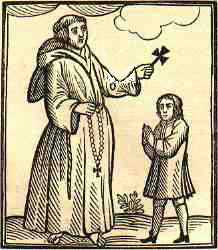The Homilies
In January 1542, the governing body of the Church of England (the Convocation of the Archbishopric of Canterbury) agreed to issue prescribed homilies, or sermons, to be used by unschooled clergy in preaching. Once adopted*, the homilies provided a core of Anglican teaching. The original homilies were largely the work of Thomas Cranmer. Note the political usefulness to the monarch of some of the topics, especially numbers 10 and 12.
A Second Book of Homilies was issued during the reign of Elizabeth I with 21 additions. Again, the political role of the Church is evident in the 21st homily, "Against Rebellion," added in 1571 in response to the Northern Rebellion of 1569.
The twelve homilies
- A fruitful Exhortation to the Reading of
-
Holy Scripture
- Of the Misery of all Mankind
- Of the Salvation of all Mankind
- Of the True and Lively Faith
- Of Good Works
- Of Christian Love and Charity
- Against Swearing and Perjury
- Of the Declining from God
- An Exhortation Against the Fear of Death
- An Exhortation to Obedience*
- (and a warning against disorder)*
- Against Whoredom and Adultery
- Against Strife and Contention
Footnotes
-
Dangerous homilies
The first collection of twelve homilies was produced in January 1543, but Henry VIII refused to authorize it, finding it too radical. It was not formally issued until 1547, under the rule of the protectorate of Edward VI.
-
An Exhortation to Obedience
A statement of cosmic order, macrocosm and microcosm, begins the exhortation:
Almighty God hath created and appointed all things in heaven, earth, and waters, in a most excellent and perfect order. In heaven he hath appointed distinct orders and states of archangels and angels. In earth he hath assigned kings, princes, with other governors under them, all in good and necessary order. . . . The sun, moon, stars, rainbow, thunder, lightning, clouds and all birds of the air do keep their order. The earth, trees, seeds, plants, herbs, corn, grass, and all manner of beasts keep them in their order. . . . All kinds of fishes in the sea, rivers and waters, with all fountains, springs, yea the seas themselves, keep their comely course and order.
And man himself also hath all his parts, both within and without, as soul heart, mind, memory, understanding, reason, speech, with all and singular corporal members of his body, in a profitable, necessary and pleasant order.
-
Disorder and disaster
. . . For where there is no right order, there reigneth all abuse, carnal liberty, enormity, sin and Babylonical confusion. Take away kings, princes, rulers, magistrates, judges, and such states of God's order, no man shall ride or go by the highway unrobbed, no man shall sleep in his own house or bed unkilled, no man shall keep his wife, children, and possessions in quietness; all things shall be common, and there must needs follow all mischief and utter destruction both of souls, bodies, goodness and commonwealths.
But praised be God, that we in England feel not the horrible calamities, miseries, and wretchedness, which all they undoubtedly feel and suffer that lack this godly order. . . .
(Compare the speech Shakespeare gives the wily, and rather sanctimonious, Ulysses, in Troilus and Cressida.)
